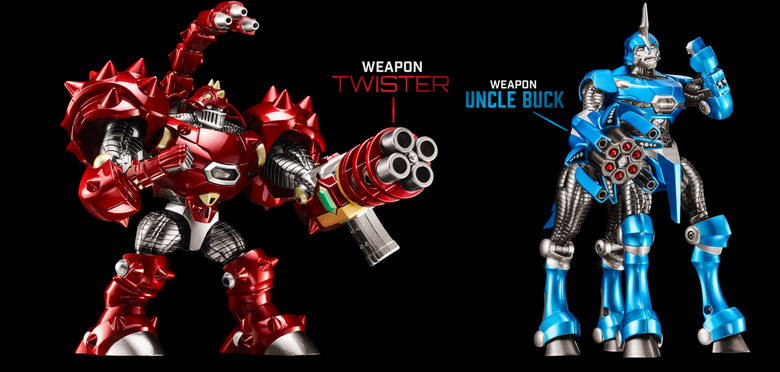Infinite Arms brings transforming robots to physical, digital world
Kids, especially boys, have developed a new taste in entertainment compared to children their age more than a decade ago. Sure, they're still interested in robot and cars and anything that goes boom, but nowadays they're even more interested when those are in their smartphones or tablets. Trying to capitalize on that and introduce a new trend and business, Jumo, a company that employs a few luminaries from the games and toys business, is introducing the Infinite Arms mobile game and the idea of "games-to-life" as the next generation of toys and games for a slightly older generation.
The idea of bridging physical toys with digital games, what is being called "toys-to-life" these days, isn't exactly new. One can perhaps credit Skylanders and, later on, Dinsey Infinity and Nintendo's Amiibos, for popularizing that type of gameplay. However, those three practically involve static, unmoving figurines that you have to buy just to get the code to inject them into the digital game world. On the other hand, there's Anki that sort of comes from the other direction, with toy race cars and games that play out in the real world but can be controlled by a smartphone to some limited extent.
Infinite Arms is both familiar and new, and one that could successfully appeal to a new generation of children who grew up around mobile games. There are physical toys involved, for sure, but these aren't your simple statuesque Skylander or Amiibo toy. These are fully poseable robots that can be equipped with physical weapons, calling to mind toys like Transformers. Which isn't surprising considering Yasuo Takahama, a designer who has his hands deep in Tamagotchi and Transformers, is part of Jumo's team. But more than simple toys that happen to have associated PIN codes for a digital, mobile counterpart, these robots connect to the game more deeply than an Amiibo or even an Anki. Attach a weapon, for example, and you'll see it automatically attached to the robot's digital counterpart in your smartphone. The mobile game is totally free to play and consists of single player campaigns as well as multi-player skirmishes and missions.
More than just a new product line, however, Jumo is aiming for a new type of business and a new production model for Infinite Arms. For one, the game will fully derive its profits from sales of the toys and accessories. There will be in-app purchases in the sense that it will only be through the game that you can buy the physical products. No Toys'R'Us for you. Jumo has partnered with Amazon for this part of the business.
Another interesting deviation is how those products will be made and how often they will be made. Jumo has seen the problems with the like of Skylanders and Disney Infinity, who couldn't innovate and churn out new toys fast enough. While Infinite Arms only has two robots so far, the company plans to put out new robots and their accompanying accessories on a four-month seasonal, episodic basis. The secret to this fast process? Fast prototyping and 3D printing. Even more interesting is that Jumo plans to make each season's robots a limited edition. Meaning once they've sold out on a particular robot and accessories, they won't be making them again.

It is definitely a risking and bold venture, especially in a world where, at least on the mobile side, gaming has become almost a rote process of spitting out clones of one-hit wonders. Depending on its actual implementation and performance, Infinite Arms could indeed revolutionize not just toys and games, but the very business that revolves around them.
Infinite Arms launches on iOS and Android this summer.
VIA: VentureBeat
